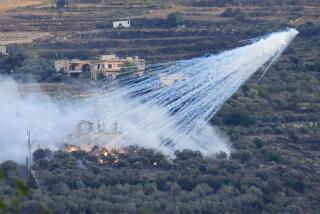U.N. Could Set the Stage for a Chemical-Arms Ban
- Share via
Members of Congress and the Administration have taken bold diplomatic steps to censure Iraq’s use of poison gas against its Kurdish population. The Senate has imposed economic sanctions and the Administration has called for a special United Nations investigation. These may be small but important steps in pushing the poison-gas genie back into the bottle.
Reports indicate that poison gas has in the past been used in Angola, by the Egyptians in Yemen, in Afghanistan and in Southeast Asia.
Iran and Iraq violated the terms of the 1925 Geneva Protocol prohibiting the use of poisonous chemical and biological weapons, which they both signed 50 years ago as have others. The successful use of chemical weapons in this war continues a trend begun about a decade ago, and has stimulated other nations, particularly in the Middle East, to acquire poison gas. These very same nations are also acquiring ballistic missiles that can deliver warheads containing toxic chemicals. Since there are no practical defenses against ballistic missiles in place, tens of millions of urban residents could already be hostage to chemical attack. In a few years, hundreds of millions could be at risk.
To date, only relatively feeble efforts have been undertaken by the industrial nations, in the form of the Australia group, to stem the supply of precursor chemicals needed to produce poison gas. The United States does control, through license, the export of precursor chemicals, and maintains an outright ban on exports to nations deemed supporters of terrorism. But the United States exports only a fraction of the chemicals in the world economy, and the industrial nations need to do more to help curb exports.
In Geneva, the U.N. 40-nation Committee on Disarmament has been laboring almost non-stop for years to ban the production, transfer, storage and, indeed, the very existence of toxic-chemical weapons. It is uncertain how long these negotiations must continue to conclude a workable treaty banning these weapons, or even whether such a treaty can be developed.
While the Geneva negotiations strive for a workable treaty, the U.N. General Assembly and Secretary General Javier Perez de Cuellar should now act boldly. They should propose, as part of an enduring peace treaty ending the gulf war, a total ban for each of the antagonists on the possession of poison gas or munitions containing toxic chemicals. The United Nations should also negotiate an on-site inspection regime, which would permit U.N. inspectors to monitor chemical and military sites throughout each country to verify compliance with the treaty.
If such negotiations were successful they would serve two important purposes. First, they would add a measure of confidence to the Iran-Iraq truce by assuring that neither side openly pursues preparations for manufacturing, testing or using poison gas. Second, they would establish a precedent and model for agreement between other antagonist nations in the region and elsewhere and could help solve some of the knotty inspection problems currently being negotiated as part of a global chemical-weapons ban in Geneva.
The U.S. government, both presidential candidates and the Soviets endorse a treaty to eliminate all chemical weapons. Diplomatic pressures and incentives may be brought to bear on Iran and Iraq by the nations of the world, large and small, supporting the U.N. secretary general in pursuing this initiative. There is no certainty that either Iran or Iraq would want or accept a bilateral agreement with U.N. monitoring banning their stocks of chemical weapons. But if they did not, they would continue to suffer politically, making more difficult their return to normal diplomatic relations. Moreover, should the United Nations fail to persuade Iran and Iraq to negotiate a treaty and forgo poison gas as an instrument of war, and not impose some form of sanctions, it would be an unfortunate signal to other nations that those who follow the Iran-Iraq model would suffer no serious political consequences.
Whether the United Nations and the secretary general are up to taking on this difficult mission is uncertain. If it is attempted, prospects for success may not be high, given the political, military and technical barriers to be overcome. But if no attempt is made or attempts fail, poison gas weapons will surely proliferate. Over the past 45 years, nations with nuclear weapons increased, on average, by one to two per decade. Nations are acquiring chemical weapons at 10 times that rate.
The United Nations has a unique opportunity to reverse the chemical-arms race. It should act now.
More to Read
Sign up for Essential California
The most important California stories and recommendations in your inbox every morning.
You may occasionally receive promotional content from the Los Angeles Times.













